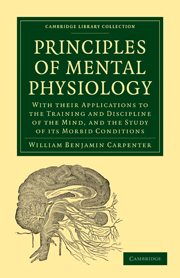 Principles of Mental Physiology
Principles of Mental Physiology Book contents
- Frontmatter
- PREFACE
- Contents
- BOOK I GENERAL PHYSIOLOGY
- CHAPTER I OF THE GENERAL RELATIONS BETWEEN MIND AND BODY
- CHAPTER II OF THE NERVOUS SYSTEM AND ITS FUNCTIONS
- CHAPTER III OF ATTENTION
- CHAPTER IV OF SENSATION
- CHAPTER V OF PERCEPTION AND INSTINCT
- CHAPTER VI OF IDEATION AND IDEO-MOTOR ACTION
- CHAPTER VII OF THE EMOTIONS
- CHAPTER VIII OF HABIT
- CHAPTER IX OF THE WILL
- BOOK II SPECIAL PHYSIOLOGY
- APPENDIX. DR. FERRIER'S EXPERIMENTAL RESEARCHES ON THE BRAIN
- INDEX
CHAPTER III - OF ATTENTION
Published online by Cambridge University Press: 29 August 2010
- Frontmatter
- PREFACE
- Contents
- BOOK I GENERAL PHYSIOLOGY
- CHAPTER I OF THE GENERAL RELATIONS BETWEEN MIND AND BODY
- CHAPTER II OF THE NERVOUS SYSTEM AND ITS FUNCTIONS
- CHAPTER III OF ATTENTION
- CHAPTER IV OF SENSATION
- CHAPTER V OF PERCEPTION AND INSTINCT
- CHAPTER VI OF IDEATION AND IDEO-MOTOR ACTION
- CHAPTER VII OF THE EMOTIONS
- CHAPTER VIII OF HABIT
- CHAPTER IX OF THE WILL
- BOOK II SPECIAL PHYSIOLOGY
- APPENDIX. DR. FERRIER'S EXPERIMENTAL RESEARCHES ON THE BRAIN
- INDEX
Summary
116. It has been the Writer's object in the preceding Chapter, not only to explain the general structure and working of the Nervous mechanism, but also to indoctrinate the Reader with that idea of its reflex activity, which we derive from experiment on the lower Animals, and from observation of the phenomena of disease or injury in Man. For the information we obtain from the study of the lower centres, in regard to that form of reaction which manifests itself directly in Muscular motion, furnishes the key to the study of that reflex activity of the higher centres, which expresses itself in states of Consciousness,—namely, in the production of Sensations, the formation of Ideas, and the excitement of Emotions; these states of activity being either the excitors of other Cerebral changes of the like kind, or discharging themselves (so to speak) by operating downwards on the Muscular apparatus.—It seems desirable, at our very entrance upon the enquiry into the action of these higher centres-(which is, in fact, the Physiology of the Mind) to take special note of the active as distinguished from the passive state of recipiency for impressions which are brought to the Sensorium, whether by the nerves of the external or by those of the internal senses (§ 89); in virtue of which we fix our Attention either on something that is going on outside us, or on something that is going on within us, instead of being affected by each impression exactly in proportion to its strength.
- Type
- Chapter
- Information
- Principles of Mental PhysiologyWith their Applications to the Training and Discipline of the Mind, and the Study of its Morbid Conditions, pp. 130 - 147Publisher: Cambridge University PressPrint publication year: 2009First published in: 1874


